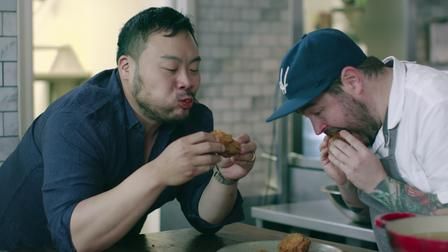
Food Writing for Fans of Ugly Delicious
Ugly Delicious is, pardon my very personal opinion, a balm for the soul. It is not a perfect show, but it tackles big issues like racism, appropriation, and classism in one of the most human of ways, i.e. through food. I may not always see eye-to-eye with Chang and/or Meehan—partly because I am short and hate making eye-contact—but I do hope they are granted a second season, to make good on their promise to be more inclusive and also because my life isn’t getting any less stressful—I need more magic balm to rub into my eyeballs. Until then, however, I have compiled a list of books to help me, and possibly you, to get through this difficult waiting period.
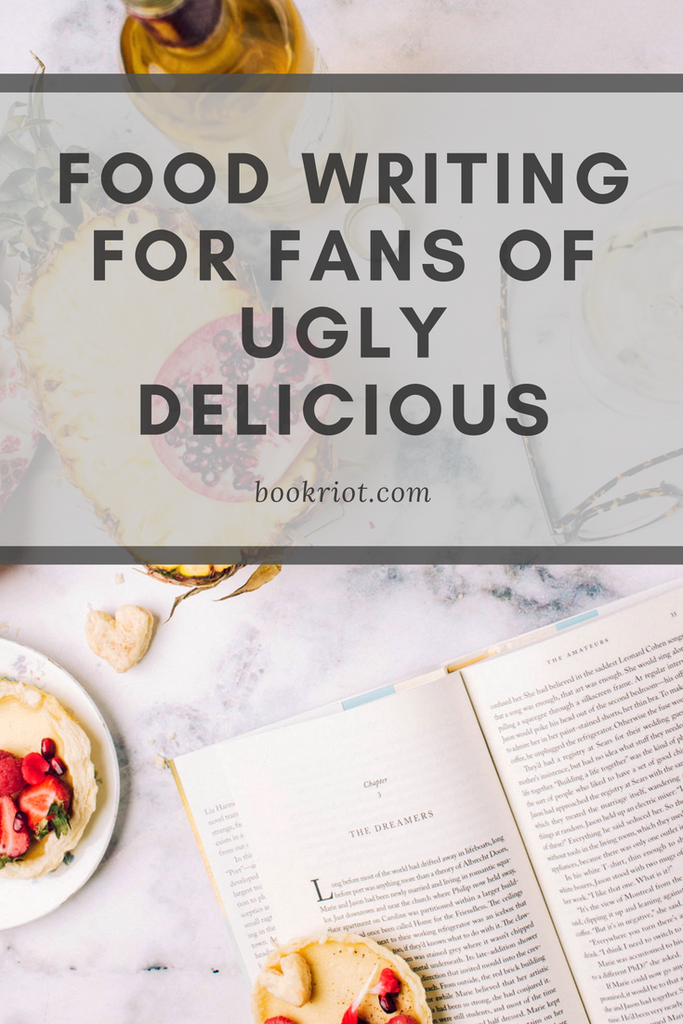
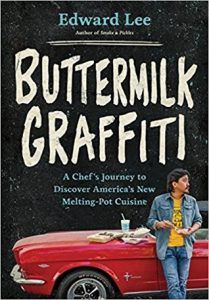 The first book I picked up after I finished the show was Edward Lee’s Buttermilk Graffiti. The book is part memoir, part travel, and all about how immigrants and refugees shape modern American cuisine. Yes, it’s relevant as hell. Yes, you will cry as you read it against the current political backdrop. And yes, it is, cover to cover, excellent. Lee splits his focus between events from his life and the people he meets along the way so perfectly. Plus, Lee’s interviews and conversations are so damned interesting, his recipes so intriguing, I cannot recommend this one enough. The book basically feels like a Christmas Special episode of Ugly Delicious.
The first book I picked up after I finished the show was Edward Lee’s Buttermilk Graffiti. The book is part memoir, part travel, and all about how immigrants and refugees shape modern American cuisine. Yes, it’s relevant as hell. Yes, you will cry as you read it against the current political backdrop. And yes, it is, cover to cover, excellent. Lee splits his focus between events from his life and the people he meets along the way so perfectly. Plus, Lee’s interviews and conversations are so damned interesting, his recipes so intriguing, I cannot recommend this one enough. The book basically feels like a Christmas Special episode of Ugly Delicious.
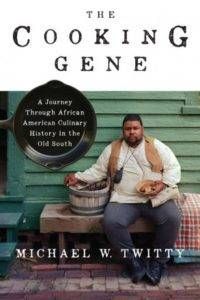 Whatever you felt was lacking in the show Ugly Delicious, I guarantee you will find in Michael Twitty’s The Cooking Gene. I have started and stopped this book so many times, but after it won the James Beard award for writing as well as for book of the year, I binged it. I came to realize, this is not a book you read over lunch breaks or while your chai is brewing, this is the book you read all at once because even though it is a generations long history, it is urgently leading you to your own present and how you view food, specifically Southern food, and the cultural value it carries. I know multiple Rioters have spoken about this one, including myself. I don’t have anything new to add here, except that even if you have no interest in food or history, but have an interest in social justice, I’d recommend this one alongside authors like Ijeoma Oluo and Roxane Gay and Angie Thomas. Also, it just came out in paperback. Just sayin’.
Whatever you felt was lacking in the show Ugly Delicious, I guarantee you will find in Michael Twitty’s The Cooking Gene. I have started and stopped this book so many times, but after it won the James Beard award for writing as well as for book of the year, I binged it. I came to realize, this is not a book you read over lunch breaks or while your chai is brewing, this is the book you read all at once because even though it is a generations long history, it is urgently leading you to your own present and how you view food, specifically Southern food, and the cultural value it carries. I know multiple Rioters have spoken about this one, including myself. I don’t have anything new to add here, except that even if you have no interest in food or history, but have an interest in social justice, I’d recommend this one alongside authors like Ijeoma Oluo and Roxane Gay and Angie Thomas. Also, it just came out in paperback. Just sayin’.
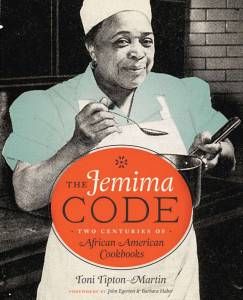 Anything that is could possibly have been left unsaid by The Cooking Gene is covered by The Jemima Code, by Toni Tipton-Martin. The book collects and contextualizes 150 cookbooks of African American food. Tipton-Martin organizes the cookbooks chronologically and traces their significant impact on American food culture. It is part history lesson and part biography and encompasses the efforts of so many once forgotten Black women. I have a feeling it would be worth it to read this one alongside The Cooking Gene, so do learn from my mistakes.
Anything that is could possibly have been left unsaid by The Cooking Gene is covered by The Jemima Code, by Toni Tipton-Martin. The book collects and contextualizes 150 cookbooks of African American food. Tipton-Martin organizes the cookbooks chronologically and traces their significant impact on American food culture. It is part history lesson and part biography and encompasses the efforts of so many once forgotten Black women. I have a feeling it would be worth it to read this one alongside The Cooking Gene, so do learn from my mistakes.
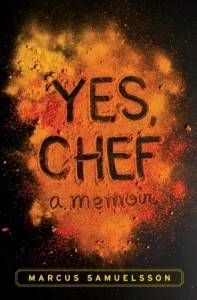 Spanning a shorter, more personal history, is Marcus Samuelsson’s memoir Yes, Chef. It has gotten rave reviews both by critics and my friends who know exactly what I value in a memoir like this one. And as I listen to the audiobook, narrated by the author himself, I know they all got it right. The tone is intensely personal and, like the rest of the books here, shows how food is much more than a cultural signifier. It is the making of a childhood, or of an adulthood. It is nostalgia and love and trauma and bravery. I am not done with Samuelsson’s memoir just yet, but I will admit I’ve cried more over the span of these four hours than I have in the last four years, so, um, two thumbs up from me, I guess. No, but seriously, it is so good. And yes, of course, there are plenty of food descriptions to go around. It is self-indulgent in the way that Edward Lee’s memoir is, and maybe that quality has a place in memoirs. Maybe.
Spanning a shorter, more personal history, is Marcus Samuelsson’s memoir Yes, Chef. It has gotten rave reviews both by critics and my friends who know exactly what I value in a memoir like this one. And as I listen to the audiobook, narrated by the author himself, I know they all got it right. The tone is intensely personal and, like the rest of the books here, shows how food is much more than a cultural signifier. It is the making of a childhood, or of an adulthood. It is nostalgia and love and trauma and bravery. I am not done with Samuelsson’s memoir just yet, but I will admit I’ve cried more over the span of these four hours than I have in the last four years, so, um, two thumbs up from me, I guess. No, but seriously, it is so good. And yes, of course, there are plenty of food descriptions to go around. It is self-indulgent in the way that Edward Lee’s memoir is, and maybe that quality has a place in memoirs. Maybe.
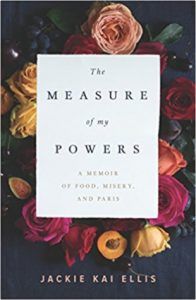 Thing is, the stuff that I see as self-indulgent in memoirs by cis men are typically praised by readers and tend to be the same things that gets most memoirs by women and marginalized authors the most flack. This holds true of fiction, though in this case, it is a more of a hypothesis. I will test the theory when I get around to reading Jackie Kai Ellis’s The Measure of My Powers. Weirdly enough it was a bad review of the book that made me want to read it the most. The reviewer described it as a miserable version of Eat, Pray, Love and the most sad memoir to be set in Paris. Since I’m not part of the Paris/Gilbert fandom, that immediately piqued my interest. I don’t think this memoir quite lines up with the rest of my picks, but it has food, it has the small ‘h’ history of a WOC, and after Anthony Bourdain, maybe we should have a food related book that talks rather directly about mental health.
Thing is, the stuff that I see as self-indulgent in memoirs by cis men are typically praised by readers and tend to be the same things that gets most memoirs by women and marginalized authors the most flack. This holds true of fiction, though in this case, it is a more of a hypothesis. I will test the theory when I get around to reading Jackie Kai Ellis’s The Measure of My Powers. Weirdly enough it was a bad review of the book that made me want to read it the most. The reviewer described it as a miserable version of Eat, Pray, Love and the most sad memoir to be set in Paris. Since I’m not part of the Paris/Gilbert fandom, that immediately piqued my interest. I don’t think this memoir quite lines up with the rest of my picks, but it has food, it has the small ‘h’ history of a WOC, and after Anthony Bourdain, maybe we should have a food related book that talks rather directly about mental health.
Now bring on season two!








